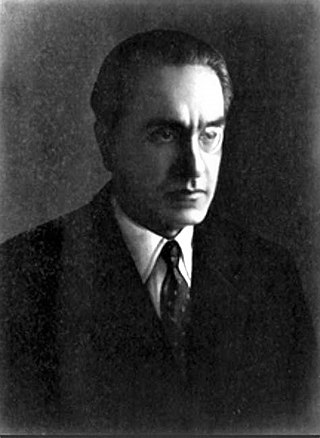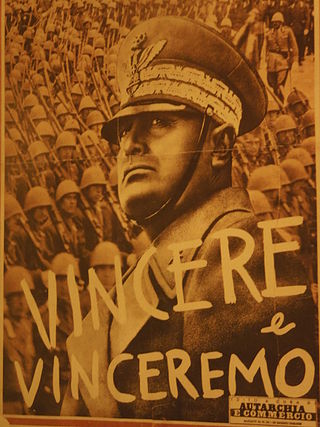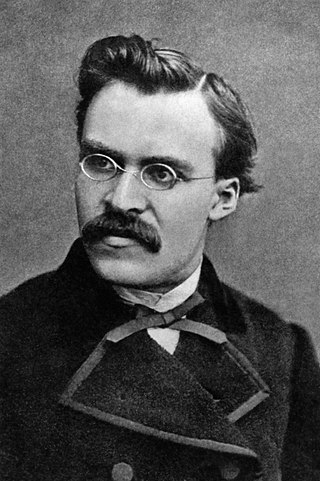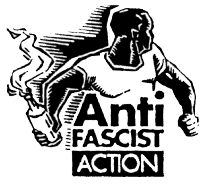
Fascism is a far-right, authoritarian, ultranationalist political ideology and movement, characterized by a dictatorial leader, centralized autocracy, militarism, forcible suppression of opposition, belief in a natural social hierarchy, subordination of individual interests for the perceived good of the nation and/or race, and strong regimentation of society and the economy.

Giulio Cesare Andrea "Julius" Evola was an Italian far-right philosopher. Evola regarded his values as aristocratic, monarchist, masculine, traditionalist, heroic, and defiantly reactionary. An eccentric thinker in Fascist Italy, he also had ties to Nazi Germany; in the post-war era, he was an ideological mentor of the Italian neo-fascist and militant Right.

The National Front (NF) is a far-right, fascist political party in the United Kingdom. It is currently led by Tony Martin. A minor party, it has never had its representatives elected to the British or European Parliaments, although it gained a small number of local councillors through defections and it has had a few of its representatives elected to community councils. Founded in 1967, it reached the height of its electoral support during the mid-1970s, when it was briefly England's fourth-largest party in terms of vote share.

In the political history of Germany, the Führerprinzip was the basis of executive authority in the Government of Nazi Germany (1933–1945), which meant that the word of the Führer is above all written law, and that government policies, decisions, and offices all work towards the realisation of the will of the Führer. In practise, the Führerprinzip was the dictatorship of the leader to dictate the ideology and policies of a political party; therefore, such a personal dictatorship is a basic characteristic of fascism.
International Third Position (ITP) was a neo-fascist organisation formed by the breakaway faction of the British National Front, led by Roberto Fiore, an ex-member of the Italian far-right movement Third Position.

Strasserism is an ideological strand of Nazism which adheres to revolutionary nationalism and to economic antisemitism, which conditions are to be achieved with radical, mass-action and worker-based politics that are more aggressive than the politics of the Hitlerite leaders of the Nazi Party. Named after Gregor Strasser and Otto Strasser, the ideology of Strasserism is a type of Third Position, right-wing politics in opposition to Communism and to Hitlerite Nazism.
The Official National Front (ONF) was one of two far-right groups to emerge in the United Kingdom in 1986 following a split within the National Front. Following ideological paths that were mostly new to the British far-right, the ONF stood opposed to the more traditionalist Flag Group.
The Third Position is a set of neo-fascist political ideologies that were first described in Western Europe following the Second World War. Developed in the context of the Cold War, it developed its name through the claim that it represented a third position between the capitalism of the Western Bloc and the communism of the Eastern Bloc.
Kerry Raymond Bolton is a New Zealand white supremacist and Holocaust denier, and a published author and political activist on those subjects. He is involved in several nationalist and fascist political groups in New Zealand.

National-anarchism is a radical right-wing nationalist ideology which advocates racial separatism, racial nationalism, ethnic nationalism, and racial purity. National-anarchists syncretize ethnic nationalism with philosophical anarchism, mainly in their support for a stateless society, while rejecting anarchist social philosophy. The main ideological innovation of national-anarchism is its anti-state palingenetic ultranationalism. National-anarchists advocate homogeneous communities in place of the nation state. National-anarchists claim that those of different ethnic or racial groups would be free to develop separately in their own tribal communes while striving to be politically horizontal, economically non-capitalist, ecologically sustainable, and socially and culturally traditional.

The history of fascist ideology is long and it draws on many sources. Fascists took inspiration from sources as ancient as the Spartans for their focus on racial purity and their emphasis on rule by an elite minority. Fascism has also been connected to the ideals of Plato, though there are key differences between the two. Fascism styled itself as the ideological successor to Rome, particularly the Roman Empire. From the same era, Georg Wilhelm Friedrich Hegel's view on the absolute authority of the state also strongly influenced fascist thinking. The French Revolution was a major influence insofar as the Nazis saw themselves as fighting back against many of the ideas which it brought to prominence, especially liberalism, liberal democracy and racial equality, whereas on the other hand, fascism drew heavily on the revolutionary ideal of nationalism. The prejudice of a "high and noble" Aryan culture as opposed to a "parasitic" Semitic culture was core to Nazi racial views, while other early forms of fascism concerned themselves with non-racialized conceptions of the nation.

The Combat League of Revolutionary National Socialists, more commonly known as the Black Front, was a political group formed by Otto Strasser in 1930 after he resigned from the Nazi Party (NSDAP) to avoid being expelled.

Friedrich Nietzsche's influence and reception varied widely and may be roughly divided into various chronological periods. Reactions were anything but uniform, and proponents of various ideologies attempted to appropriate his work quite early.

Anti-Fascist Action (AFA) was a militant anti-fascist organisation, founded in the UK in 1985 by a wide range of anti-racist and anti-fascist organisations.
Richard Lawson has been a member of various far right groups in the United Kingdom.
Derek Holland is a figure on the European far-right noted for his Catholic Integralism.

National Bolshevism, whose supporters are known as National Bolsheviks and colloquially as Nazbols, is a syncretic political movement committed to combining ultranationalism and communism.
Proletarian nation was a term used by 20th century Italian nationalist intellectuals such as Enrico Corradini to refer to Italy and other nations that they regarded as being productive, morally vigorous, and inclined to bold action, which they considered to be characteristics associated with the proletariat. Corradini admired revolutionary proletarian movements such as syndicalism for their tactics, although he opposed their goals, and he wanted to inspire a radical nationalist movement that would use similar tactics in service of different goals: a movement that would advocate imperialist war in place of class revolution, while maintaining the same methods of "maximum cohesion, concentration of forces, iron discipline and utter ruthlessness." Corradini associated the concept of proletariat with the economic function of production, arguing that all producers are in a moral sense proletarian, and he believed that all producers should be at the forefront of a new imperialist proletarian nation.
The Ideology of the National Front comprises the beliefs held by the National Front, a far-right political party in the United Kingdom. These beliefs, including nationalism, racism, and opposition to Marxism, have been compared to fascism, although the party rejected the term as a description of its political stance.










